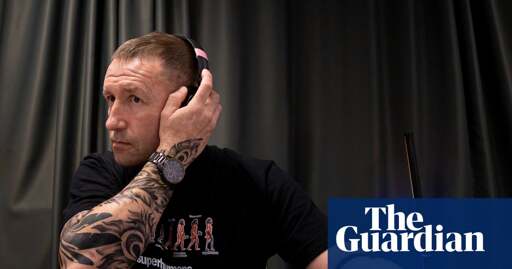In Ukraine, sound carries a different weight: the cautionary blurt of sirens, Shahed drones humming overhead, the concussive thwack of air defence interception and the subsequent explosion. But as well as the sounds of war, which continue three and a half years into Russia’s full-scale invasion, music still plays, clubs remain open during the day (closing well before the midnight curfew), and electronic dance music remains an intrinsic part of many Ukrainian lives.
Kyiv’s iconic clubs, such as K41, became bomb shelters before transforming into frontline fundraisers. Parties doubling up as cleanup operations are held at strike sites. New venues such as Abo Records – the first of many creative spaces to set up shop in an abandoned liquor factory – have emerged as gathering points where you might share a cigarette with a sniper or combat medic as easily as with a DJ. But the rehabilitative power of dance music is most evident at the Superhumans centre, near Lviv in the west of Ukraine. Here, the most critically war-wounded are treated with prosthetics and reconstructive surgery, and psychological support is given to children and adults affected by the war. And within the range of treatment is music therapy.
Howard Buffett, the son of Warren Buffett and one of the centre’s chief funders, suggested forming a Superhumans band, so the centre teamed up with music charity Victory Beats, which was set up one year into the war to provide veterans with relaxation and a nonverbal outlet for emotional expression.
“We were working with a 25-year-old soldier with severe brain damage and limited use of his hand,” the charity’s founder, Volodymyr Negodada, remembers. “We started with a [sound-based] relaxation session designed to calm the nervous system, but stopped almost immediately because the low frequency triggered pain. When he started to feel better, he asked for a DJ console.”


